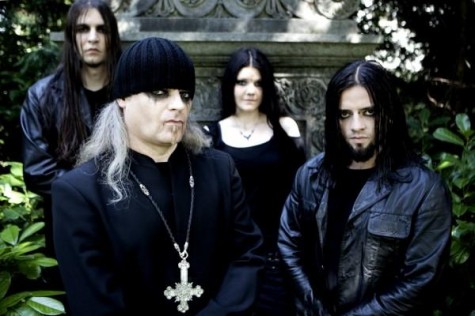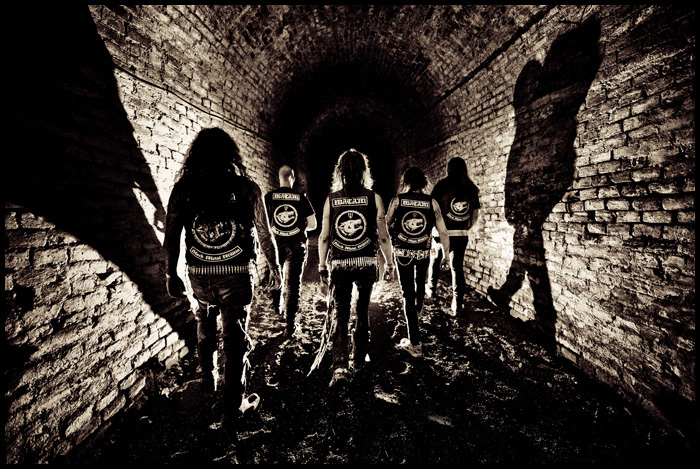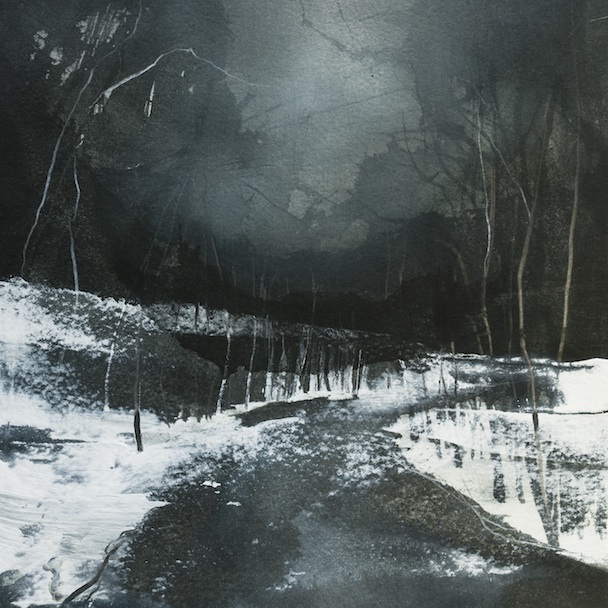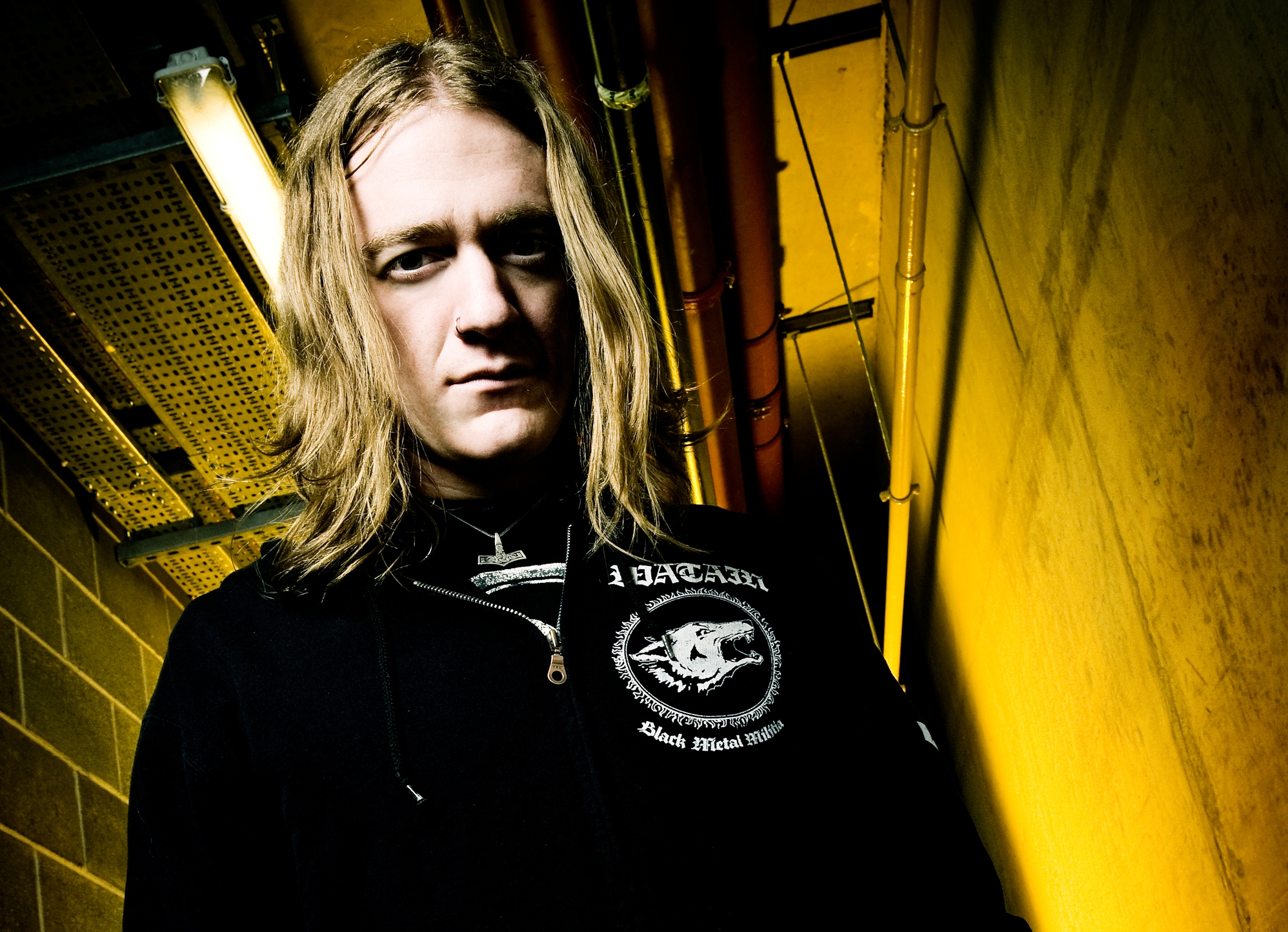

Thomas Gabriel Fischer (center) fronts Triptykon, who will play Manhattan's Gramercy Theater on October 6.
Thomas Gabriel Fischer, aka Tom G. Warrior, is the frontman of Triptykon and architect behind the black-metal band’s first full-length masterpiece, Eparistera Diamones, which was released earlier this year. Fischer is more commonly known as one of the founding members of Celtic Frost, a legendary and highly influential act in underground metal. In support of a new EP, Triptykon will embark on a US tour starting in New York on October 6 at the Gramercy Theater. In this interview, Fischer discusses his new project as well as the demise of Celtic Frost.
Long Island Press: Why are you releasing your first EP, “Shatter,” so soon after your full-length debut?
Thomas Gabriel Fischer: Why not? We felt we had very strong material. We felt that all the songs that we decided to take to the studio for the album were strong enough for release. We had a very extensive pre-production, and we had not wasted material that was not fit for release. So what we took to the studio we felt was strong enough to be released. And the album had a very long playing time, so we couldn’t possibly cram any more material on there. So the idea for the EP arose quite early on. Then we played the Roadburn Festival in Holland where we recorded everything. And also Nocturno Culto [Darkthrone] came on stage with us to perform the lead vocals for Celtic Frost’s “Dethroned Emperor,” and that version turned out so amazingly. I personally feel his vocals are much better than mine. It was basically all we needed for the EP. It was completed very early on. Now going to the United States, we felt it was the perfect timing to release this.
LIP: How is the chemistry with your new band mates?
TGF: It’s been fantastic. I realize most bands will probably tell you that, but it probably is a huge cliché. But I’m actually able to tell the difference because the last few years of Celtic Frost were extremely difficult on the unit level. And I for one certainly know the difference, and I have learned to appreciate the difference. But Triptykon is amazing. It’s something I haven’t felt ever since the Hellhammer days. It’s basically a circle of friends creating music, and it’s almost like a substitute family. It’s very difficult to find a bunch of people playing such extreme music and finding such close friendship together. But we have somehow managed that in Triptykon, and I appreciate this massively. It’s like day and night from Celtic Frost, and I’m enjoying it.
LIP: Do you have most of the say in the creative process?
TGF: They hand it to me. It’s not because I want to take it, and it’s not because I demand it. It’s actually very much a band. But I think because of my experience they of course ask me for my advice and my opinions. But the fact remains that everything is decided as a band. It’s certainly not a Tom Warrior dictatorship. I made it clear from the very first day of Triptykon that I would like everybody to be involved. V. Santura has already written music, and he’s writing more for the new album that’s going to come in a year or so. And there are absolutely no personality clashes. That’s interesting, it might be for them to hear my experience, and it’s interesting for me to hear their freshness. They come from a different generation of musicians. With the two approaches, it’s a very organic relationship right now.
LIP: Where is this flow of creativity coming from?
It’s definitely the human factor. Actually, just a couple days ago somebody wrote on the discussion board of the Triptykon website that he had the feeling that the human environment in Celtic Frost was hindering the creativity; that it was actually prolonging everything instead of aligning with fruitful creativity. And I took the liberty to answer to that post, and I was saying that’s exactly how I perceived it, too. Triptykon’s album came after a year, and I personally feel that it’s comparable to the last Celtic Frost album. The last Celtic Frost album took five and a half years to create. It felt immensely rewarding as a creative force in Tryptykon. My contributions were evaluated in a constructive manner. And that doesn’t mean there wasn’t criticism. As musicians we all have our opinions, and that’s very important for the benefit of the quality. It was in an extremely mature and constructive manner, where in Celtic Frost even the slightest mistake you’d make was torn apart, butchered. You were ridiculed. It was extremely difficult to remain honestly creative. At the end of the day, I almost felt like keeping my best material to myself and not bringing it to rehearsal with Celtic Frost.
 LIP: Was it difficult to work with Martin Eric Ain [Celtic Frost] on the photo book, Only Death is Real?
LIP: Was it difficult to work with Martin Eric Ain [Celtic Frost] on the photo book, Only Death is Real?
TGF: Martin’s co-authorship credit stems from the very, very early days of the book when we were still working in Celtic Frost, and the book took five years to complete. When I began the book in 2005 or so, I bounced my ideas off Martin many times. What the book would look like, how we should approach it, the proper way it should be. The roots of the book were created by me and Martin together. That’s why in all fairness I kept his name on there. But everything from there on I did myself. Martin slowly withdrew from the project the more Celtic Frost deteriorated. Of course, I wasn’t so eager to have him along anyway the more Celtic Frost deteriorated. I think it came from both sides. But I did the layout of the book, I wrote the manuscript, I searched for the publisher, I collected all the photos, which was very expensive. I created everything about this book except maybe in the first few months. I wanted to be honest and fair by crediting Martin for having helped.
LIP: Where did the idea for the book come from?
TGF: The story for the book, number one, was that for most of my life I had a very difficult time addressing the fact of my youth. Certain things in my youth were so drastic that I felt simply unable to talk about them to anybody, much less to the public. I simply pushed that part of my youth away. Unfortunately, of course, that included the years in Hellhammer [Fischer and Ain’s first band]. Hellhammer was my escape from that. I did not want to be confronted. Some of the events that took place were so drastic that I felt more comfortable shunning them; completely ignoring them even though that was, of course, a completely immature approach. But I did not know how to handle it otherwise. In my forties I slowly started feeling more comfortable. The real turn around came when we were in Celtic Frost, and Martin and I talked about the early days almost as a failure. We dealt with a lot of our personal problems, Martin with his and me with mine. There was this Swiss journalist for a magazine maybe comparable to Newsweek in America who interviewed me in depth about my early years, and that was the very first time I talked openly about my feelings. It felt like such a relief. This was in my forties, but basically the path was open for the book. The second reason was that every time I went on the Internet looking for Hellhammer, I saw all these fan websites that had nothing to do with what actually happened. People had created their own Hellhammer background stories. The information was so unreliable. I thought it was time to correct that.
 LIP: You’ve never really fit into the parameters of black metal, so why do you think you’ve been so accepted by the community?
LIP: You’ve never really fit into the parameters of black metal, so why do you think you’ve been so accepted by the community?
TGF: I don’t really know. You’re correct. I personally, and we as a band, do not follow any religion. Not any Catholic or other positive Christian religion, or the so-called negative religion of Satanism and so on. We have certainly dealt with these topics in our lyrics, but we’ve never followed any of these religions. It’s very difficult for me to find the reasons between the close association with my career and the black metal scene. It is an interesting situation for both sides; I think it goes both ways, but why? If I could venture a guess, it might be because of my radicalism, which is probably my closest connection with the approach of certain black metal bands. I have never shied away from being what other people call radical. Even Martin has called me radical many times. He’s very critical of it. Perhaps radicalism is the connecting factor, but that’s just a wild guess. Martin and I have both voiced very critical opinions in the past about Satanism. I don’t know why we are still embraced the way we are.
LIP: You’ve been a professional musician for almost 30 years now. What’s your secret to longevity?
TGF: The secret would sound really simple, but it’s not. It’s the secret of persistence. I think so many musicians who were far more talented than me gave up along the way. And to me that’s always been terrible. It’s been very difficult to deal with that. I hated seeing musicians fall by the wayside.
LIP: What’s been the hardest thing you’ve dealt with over your career?
TGF: It’s definitely the loss of Celtic Frost. By far the most difficult thing I ever experienced was losing my own band, the band that was my life. The band that shaped my life, and my life shaping that band. The band that made me who I am. On a personal level, losing that band and losing it in that manner was and still is the most difficult thing I ever experienced. And it’s something I will probably never be able to live down, and it’s something that will always haunt me.
LIP: Has Ain reacted to the Celtic Frost covers on the new EP?
TGF: No. I don’t know if he’s aware, I don’t know if he’s following Triptykon, I don’t know what he thinks of that. I haven’t played him these covers yet. I don’t know if he’s heard them.
LIP: How often do you talk to Ain since the breakup?
TGF: When I left Celtic Frost we said our friendship would not be affected, but of course that was not possible. Especially given the fact that I had been cheated out of a lot of money that was due to my contributions in Hellhammer. Believe it or not, I never made a single cent from Hellhammer. That’s largely due to Martin and his actions. That probably was the final nail in the coffin. Our relationship has been reduced to maybe one text message a year. I was in Japan in June with Triptykon, and we stayed in the same hotel that Celtic Frost had stayed in a few years earlier. We played the same places that Celtic Frost played, we had the same crew, and we had the same guy handling us. So I wrote to Martin, “I’m thinking of you.” And he wrote back to me, “I’m well aware of what we have lost.” That was the nature of the exchange, and that was the first exchange in many, many months we had. And the last for many months.
LIP: Is there any chance you’ll work with Ain again?
TGF: I will never work with him again until the day I die. That door has been closed forever. And believe me, when I say something like that, I mean it. I have never reformed Hellhammer even though I got tremendously lucrative offers. So when I say something, I actually mean it. So I will never work with Martin again.
LIP: Was the issue with Ain creative or personal?
TGF: Our creative differences tended to result in amazing music. We always had creative differences, and we always worked them out. And along the line, at the end of the day, it was nothing. I think the differences were of a human nature this time around. Too much blood has been shed between the two of us. I don’t think it can be repaired, and I don’t think it should be repaired. And we have both disappointed each other tremendously. I have no desire to look back and repair something that shouldn’t be.
LIP: What has been the most interesting fan interaction over your career?
TGF: They’ve been countless. I mean, the US tours alone, I don’t know, I must have played maybe seven US tours so far, and I’ve been in touch with so many people. There have been so many interactions. I’ve met so many amazing people that I would have never met if I wasn’t a musician. I’ve had immensely inspiring conversation with members of the audience on all kinds of topics. I’ve made tremendously close friends during that time. Oh God, it’s impossible to pick one example. When you’re on tour and you don’t have some kind of attitude problem and you actually do talk to your audience, which to me, personally, I think you should because they put you there and you are lucky to even be there, and at the end of the day we’re all here for the same reason; we’re all passionate about the music, we’re all passionate about the scene, we’re all passionate about what the scene represents in our lives. To talk with like-minded people, I mean, it’s inspiring. I mean, what can I say. It’s a gift. It’s as important as the music itself.
LIP: Why have so few metal bands come out of Switzerland when the surrounding countries are producing bands by the dozens?
TGF: Switzerland is among the top three countries in the world with the strongest economies. It’s among the richest countries in the world, and they have an immensely strong economy. Everybody basically has a job here, and even a shitty job pays you an immense wage. It’s a country that’s done very well, which of course on one hand, it’s great. On the other hand, it doesn’t really serve to make young people hungry. We’ve talked about how difficult being in the rock industry can be, and when you come out of school you have the choice of taking any kind of job, making a lot of money, being able to support your family, buying a cool car, going on vacation in different countries, or risking everything for a minute amount of money, and living in a van, and living in dirty backstage areas; I mean, what position are you going to take? There’s an immense amount of talented musicians here in Switzerland playing in rehearsal, but they’re all doing it as a hobby because they all have their day jobs. And since it’s such a rich country, all people care about is money. The purpose of life here in Switzerland is not music, or finding yourself, or anything like that. It’s money. Either you work for a bank, or an insurance company, or something like that. It’s all economic. So it doesn’t really foster the hunger for an artistic career, and not just in music. In painting or sculpting, people just don’t need to go into art. They’re doing much better in regular life.







